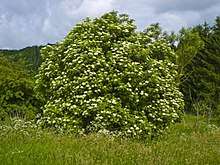elder
English
Pronunciation
- (General Australian) IPA(key): /ˈeldə/
- (Received Pronunciation) IPA(key): /ˈɛldə/
- (General American) IPA(key): /ˈɛldɚ/
- Rhymes: -ɛldə(r)
Etymology 1
From Middle English eldre, from Old English eldra, yldra, ieldra, from Proto-Germanic *alþizô. The vowel change from a to e triggered by the following i is called umlaut or I-mutation.
Adjective
elder
- Comparative of old: older, greater than another in age or seniority.
- The elder of the two was also an elder statesman
- 1913, Robert Barr, chapter 5, in Lord Stranleigh Abroad:
- She removed Stranleigh’s coat with a dexterity that aroused his imagination. The elder woman returned with dressings and a sponge, which she placed on a chair.
Usage notes
- The normal comparative of old is older. The irregular form elder is sometimes used with family members, but is otherwise rare (except in fixed expressions such as elder statesman). Elder is generally limited to attributive position (my elder brother) and does not occur in predicative position (*my brother is elder). This also implies that elder cannot be followed by than.[1]
Translations
|
|
Noun
elder (plural elders)
- An older person or an older member, usually a leader, of some community.
- We were presented to the village elder.
- One who is older than another.
- Respect your elders.
- One who lived at an earlier period; a predecessor.
- L'Estrange
- Carry your head as your elders have done.
- L'Estrange
- An officer of a church, sometimes having teaching responsibilities.
- A clergyman authorized to administer all the sacraments.
- a travelling elder
- (US, Mormonism) One ordained to the lowest office in the Melchizedek priesthood.
- After being a member of the Church for a while, Bill was ordained to the office of elder.
- Jack had been an elder for only a few days when he received a new calling.
- (US, Mormonism) Male missionary.
- The elders are coming over for dinner tonight.
- (Mormonism, often capitalized) Title for a male missionary; title for a general authority.
- One of the long-time leaders in the Church is Elder Packer.
- (paganism and Heathenry) A pagan or Heathen priest or priestess.
Translations
|
|
Verb
elder (third-person singular simple present elders, present participle eldering, simple past and past participle eldered)
Derived terms
- eldership
- elder statesman
- elder stateswoman
Etymology 2

From Middle English eldre, eller, from Old English ellærn, from Proto-Germanic *el(d)ernaz (confer Low German Elhorn, Elloorn), adjectival from Proto-Indo-European *h₁edʰ-l-i 'spruce, fir' (compare Middle Irish aidlen 'silver fir', Latin ebulum (“dwarf elder”), Old Prussian addle 'fir', Czech jedle 'silver fir', Ancient Greek ἐλάτη (elátē, “silver fir”)
Noun
elder (plural elders)
- A small tree, Sambucus nigra, having white flowers in a cluster, and edible purple berries
- Any of the other species of the genus Sambucus: small trees, shrubs or herbaceous perennials with red, purple, or white/yellow berries (some of which are poisonous).
Synonyms
- (Sambucus nigra): black elder
Derived terms
- elderberry
- elderflower
- eldern
- marsh elder
Translations
|
|
|
- The translations below need to be checked and inserted above into the appropriate translation tables, removing any numbers. Numbers do not necessarily match those in definitions. See instructions at Wiktionary:Entry layout#Translations.
|
References
Basque
Norwegian Bokmål
Old Swedish
Etymology
From Old Norse eldr, from Proto-Germanic *ailidaz.
Declension
Descendants
- Swedish: eld